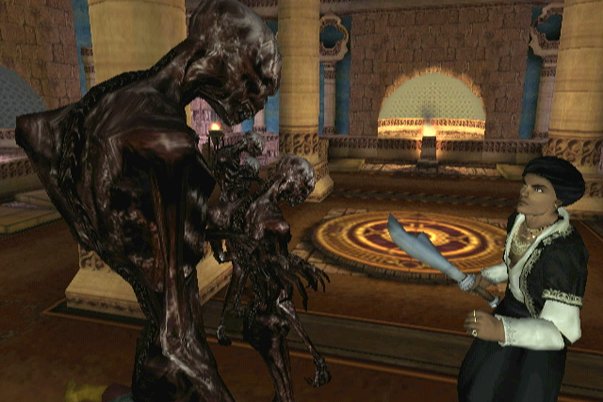Is that it?
Do gamers still want 60-hour epics? Or do good things really come in small packages?
Then there're games like Prince of Persia: Sands of Time and DK: Jungle Beat, which allow enough dexterity within the controls for you to sweep from one end of a level to another in splendidly fluid motion. Without points or prizes at stake, being able to watch your skills develop is the reward - and Jungle Beat is naughty enough to afterwards show you an even better way to reach the finish line.
And there are also the games that choose to reward exploration. The good name of the collect-athon has been sullied in recent years by Rare's fetish for aimless traipsing, but the risk/reward factor of Yoshi's Island - where you had to claim 25 unbelievably inconveniently-placed collectables while retaining full health in order to unlock extra levels - is proof that if the goal is focused and attainable enough, the gamer will take a crack. On the flipside, who knew what all that junk we were grabbing in Super Princess Peach was for?

Above: Eternal Darkness
All these examples have one thing in common; they're replayable because they're structured like games, not films. Which is why we emit a little squeak of worry when we hear Silicon Knights boss Denis Dyack (of Eternal Darkness fame) who, after delivering 60-hour epics like Legacy of Kain, is now a keen proponent of the shorter game and claiming that the solution to preventing storyline fatigue is to break up larger games into episodic chunks.
It's an argument that comes up with increasing regularity these days, especially as we stand on the cusp of electronic distribution. But although there's something to be said for a drip-feed of Phoenix Wright, it's just another viewpoint that suggests developers are still judging game length by measuring from A to B, rather than gauging the circumference of the distance traveled. But the winds of change are swirling around the games industry, as though someone suddenly rediscovered that Gale Boomerang last used 40 in-game hours ago.
Although it might not seem it at times, the ultimate deciding factor in which games get made is you, the consumer. With the DS chart bloated with what are sneeringly dismissed as "casual games," from Puzzle Quest to Nintendogs to Brain Training, it seems the public is finally wising up to the fact that it's not the size that matters. It's - and yes, we're actually going to say it - what you do with it that counts.
Weekly digests, tales from the communities you love, and more


